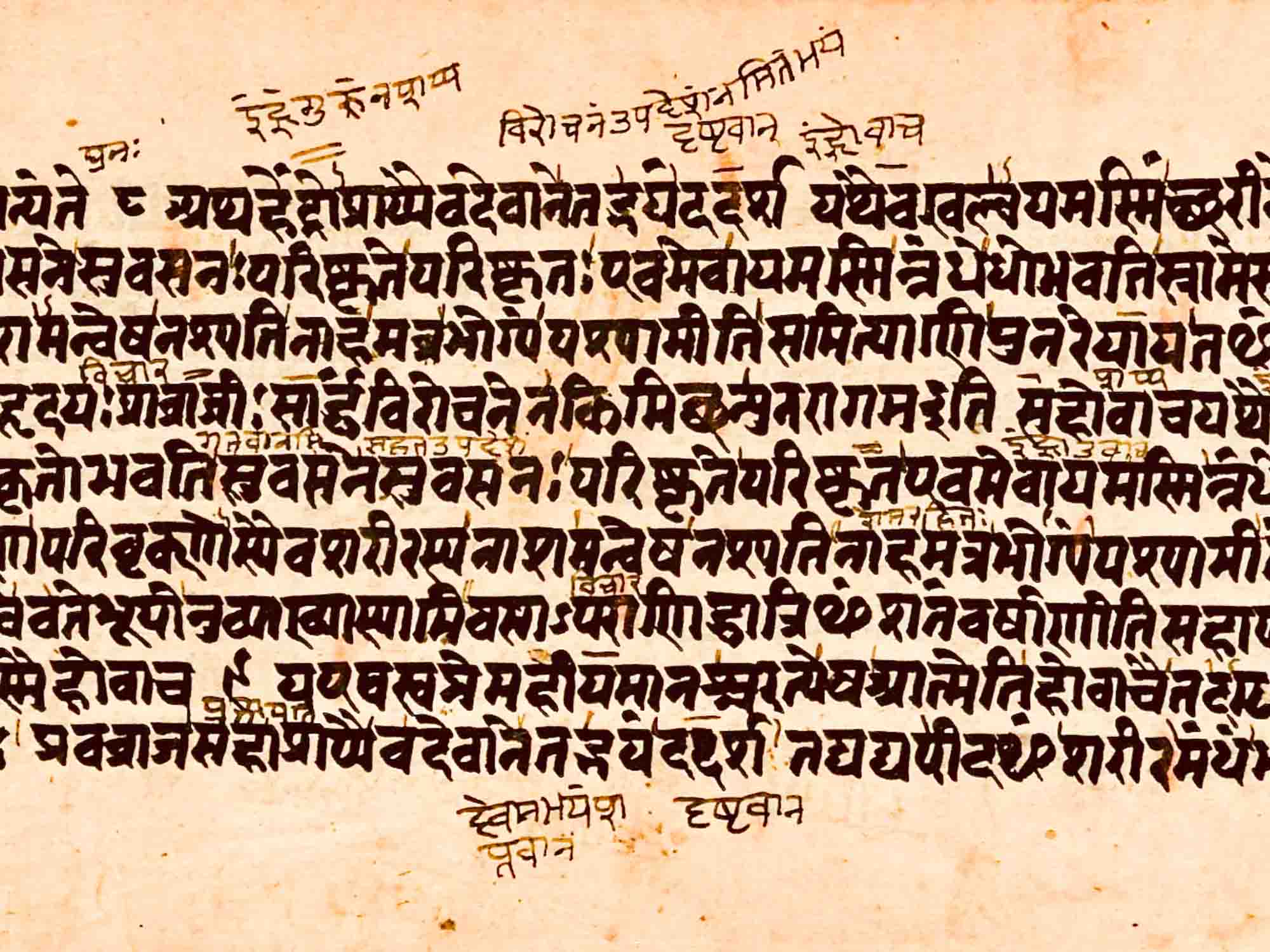«Heroes are ordinary people who make themselves extraordinary.» Gerard Way
In the Vana Parva of The Mahabharata, Yudhishthra is banished twice from his kingdom along with his brothers and wife, the second time for a period of 14 years. Overcome with shame and grief, he tells the visiting Sage Bhrihadsva that he must be the most unfortunate of all human beings, having lost his kingdom for the second time, pawning even his wife and suffering great humiliations to him and his family. To console him and give him hope and courage, Bhrihadsva narrates the heart wrenching story of King Nala and Damayanti. In the Story, King Nala loses his kingdom, is separated from his wife, undergoing unspeakable sufferings and humiliation. After a period of intense suffering, he and his wife are united and he regains his kingdom. It is said that Yudhishthira gained courage by listening to this story. He, his wife and brothers bravely endured the trials that then came. They prepared themselves for the challenges that lay ahead of them and victoriously overcame their trials and tribulations.(The Mahabharata is one of the two great epics of ancient India, being the background for the war between cousins which occurred during the time of Avatar Krishna and the form in which the Bhagavad Gita was given to the world. The entire Mahabharata is considered a referral point to understand how to follow Dharma in the midst of turbulent earthly life)
We live in a world that is becoming increasingly complex, challenging and unfair. Very often, though, solutions to complex challenges are simple. Waldorf Education places a lot of emphasis on stories. Stories shape the character of individuals and thereby determine the quality of the society we live in. Heroes are not just fictional, but rather many of them have lived or are living amongst us. Real life stories are the most inspiring because we can relate to the struggles of a fellow human being – how he or she handled challenges, how he or she was steadfast to righteousness and how the person evolved. The human spirit seeks to emulate this triumph in the same manner through every period of world history.
September 5th is celebrated in India as Teachers Day. Teachers are great influencers since they work amidst impressionable young minds. Not only in the stage till year 7, when the impulse to imitate is so strong and in the later years when students look up to a beloved authority, but anyone who is open to learning can be inspired by the lives of great souls. Today, to become famous, one needs power – financial, political, muscular – all these come ridden with compromise and controversy. The rich, powerful and so called influential have shades of grey deviated from the archetypal characters of fairy tales! We all suffer due to past karma but salvation lies in transcending karma and creating a new path, in giving rise to a new being who vanquishes the karmic patterns and challenges. Heroes are those who create new paths. Karmic churning gives birth to a new higher Ego that takes command of life and steers it towards Mukti or Liberation.
A person need not be famous to inspire. In fact the lives of people who are akin to «the person next door» are more relatable and feasible for emulation. Here is the story of a retired teacher in Chennai who is now 90 years old and continues to teach in so many ways… The lives of many unsung heroes are so inspirational that they need to be told.
K.R. Saraswathy (Saraswathy being her first name) was born in the year 1933, in North Arcot District of Tamilnadu in South India. She was married into a very affluent family at the age of 13 years, as was the custom those days. She had studied up to grade 8 then. Marriage brought with it a series of challenges. Living in a joint family set up in India in those days was both rewarding as well as challenging. By the time she was in her 20s, her family started facing financial difficulties. Soon they moved to Chennai City from the small town. At the age of 33 she got enrolled for Secondary School leaving certificate exams (SSLC) equivalent to class 10 exams. She then enrolled for being a Tamil Pandit and when she was 35 she joined as a Tamil teacher in a small school. Within two years she found employment in a bigger school as a Tamil language Teacher for class four and five students. In course of time she completed her degree in Bachelor of Education and began teaching higher classes. She became a childless widow at the age of 44 years in the year 1977. She completed her Master’s in Education when she was 55 years old.

She simultaneously did at-home tutoring for one student at a time in Carnatic music. It was not easy to do home tutoring in music after a long day of lecturing in school. Yet she did this to keep her music knowledge alive.
With the combined knowledge and expertise in literature and music, alongside her inclination towards spirituality, her lectures, music lessons were filled with insights. ‹Saraswathy Teacher› was so well read. She would often quote from the Upanishads, Puranas, Slokas and their meanings. Kamban, Thiruvalluvar and Kannadasan were her favorite poets. Her speciality was to build a bridge between philosophy and daily life. How to bring into practice lofty ideals? How to develop a strong attitude that would help remain steadfast during challenging times? – These she would weave into her lessons.
Why did she just take one student for home tuition? When she took a student, she was akin to another mother for that student. Her teaching was holistic, including literature, singing with emotion while adhering to right techniques, having rhythm in place. Part and parcel of her teaching was moulding a student’s character, enabling them to face challenges, taking the student for concerts and even for an occasional treat. Since she went to the homes of students for home tuitions, she even counseled the parents and siblings of the student if ever there was a need. She would make simple handmade gifts for students. She would hand write songs with notations in her most beautiful handwriting for young students since she composed the tunes for many of the songs.
Some conclusions from her own turbulent yet Dharmic life –
You can control a class, but emotions are the toughest to be controlled. Yet it is these emotions that make us humane and not mechanical. Practice and practice alone will help you control them.
Everyone in this world is a patient with some defect, come here to get rectified..
In olden days people gained knowledge from their experiences; today people try to gain experience with their knowledge/ information.
At a young age, anger sometimes cannot be avoided, but sadness should be avoided at all ages. In old age, anger will automatically mellow down. Sadness will affect you at the cellular level.
Introspection from young age is the biggest weapon in life.
Just focus on what is at hand, then we will move ahead. Yearning for what is not within our reach will make us sad and greedy.
Great souls will always face the toughest lives.
If you are blamed/ mistaken for something you have not done, It means your Karmic account is getting closed. So do not resent it – just detach yourself from such negativity and keep working with focus.
Life is an opportunity for learning — you have to learn and also face tests, and there is no learning without correction!
Her daily life is a beautiful exposition of rhythm. In the most trying times she did not miss her daily rituals. She makes the daintiest of ‹kolams› (rangolis/ designs that perhaps inspired form drawing), cooks her own food, and maintains a well kept house. She has specific times to prepare lesson plans, to sing, to visit relatives and friends. In the midst of doing all this she has also set aside money for charity.
I have been the student of ‹Paatu teacher› (translated as song teacher – that is what I call Saraswathy teacher) learning Carnatic vocal music since I was 12 years old. She was a very strict teacher. She also had a temper which over the years has mellowed. I stopped music lessons with her when I was 15 or 16 years old, yet our relationship continued without a break. I cherish the fact that she continues to be another mother to me today. I go stay with her in her house, she appreciates my work, advises me on how to improvise, and guides my emotional development as I deal with my young children! She tries to learn from the younger generation to move ahead with the times. I have understood from her that – once a teacher, always a mother!
Today, in her 90s, Saraswathy Teacher lives by herself, cooks food for a few who are in need, provides monetary help for a few causes, keeps her house spic and span. She is unable to sing since her voice is frail and shaky. But her clockwork days remain the same. Her zeal to be independent, helpful and steadfast is eternal. Thus continues a life filled with truth, beauty and goodness!





